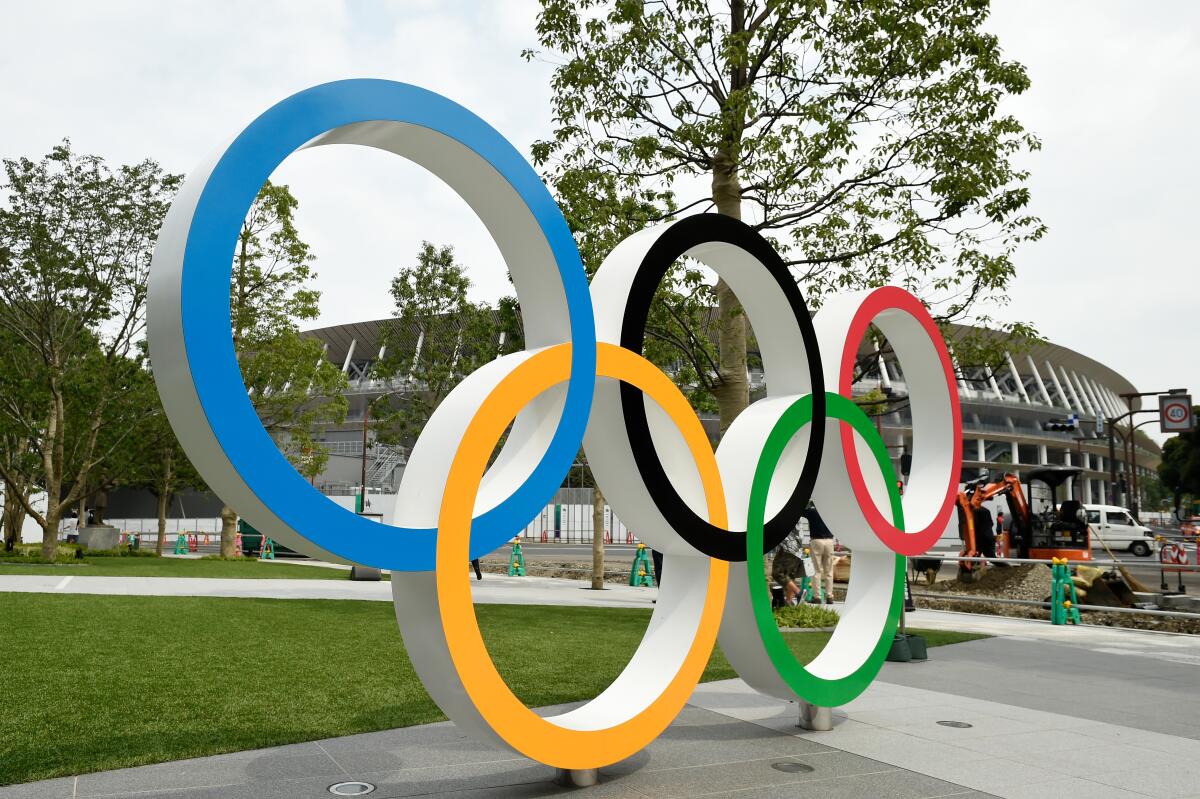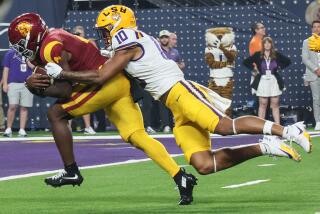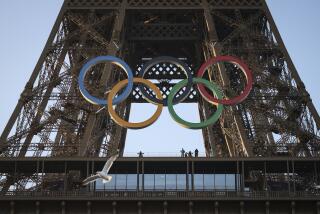No Summer Olympics in Tokyo. Why it matters to NBC

The delay of the 2020 Olympic Games in Tokyo until 2021 due to the spread of the coronavirus scuttles one of the biggest live-TV events of the year and delivers a major blow to NBC.
The International Olympic Committee and the Japanese government, citing the need “to safeguard the health of the athletes, everybody involved in the Olympic Games and the international community,” announced the postponement in a joint statement Tuesday.
The decision will cause a significant financial hit —and much disruption — for the Olympics TV rights holder, NBCUniversal, which earlier this month said it had already sold 90% of its commercials for the Games, which had been scheduled to run from July 22 to Aug. 9. The $1.25 billion the company collected so far was a new record, surpassing the total for the 2016 Games in Rio de Janiero.
“This creates a world of hurt for NBC,” said Rick Burton, a sports management professor at Syracuse University and a former executive with the U.S. Olympic Committee. “What was already a complicated year for the company just got a lot worse.”
The latest updates from our reporters in California and around the world
The Games are so important to NBCUniversal that six years ago it committed $12 billion to extend its partnership with the International Olympics Committee through 2032. Every two years, NBCUniversal has used its 17 days of Olympics coverage to forge relationships with key advertisers and millions of viewers. Its Olympics coverage also crushes its TV competitors in the ratings.
The New York-based media company, which already had advance teams in place in Japan, has been making contingency plans in recent days as it has become clear that holding the Games in July would be untenable because of the virus outbreak, which has forced the cancellation of numerous sporting events, concerts, and film and TV productions.
“Given the unprecedented obligation we all face to contain COVID-19 globally, we fully understand the decision made by the IOC, Japanese government, and the health organizations they are working with to postpone the Tokyo Olympics and Paralympics until 2021,” NBC said in a statement. “We have no doubt that the IOC and Tokyo Organizing Committee will put on an exceptional Games next year, and that the Olympic flame will once again unite the world and provide a light at the end of this tunnel.”
Four years ago, NBCUniversal generated $1.6 billion in revenue from the Rio Games, including $1.2 billion in ad revenue, according to S&P Global Market Intelligence’s Kagan unit. NBCUniversal’s commercial sales were on pace to be 6% higher this year.
NBC Sports typically sends an army of 2,000 people to an Olympic site to handle its live coverage. Many of them are freelance employees who specialize in working on live events and will essentially be out of work this year due to the postponement.
The network only has a small number of personnel on the ground in Tokyo now as the Games were still four months off, according to a person familiar with the situation who was not authorized to comment.
This year, NBCUniversal was counting on the Olympics to bring in a huge ad haul and also launch its upcoming streaming service, Peacock. The nationwide roll-out of the ad-supported service was scheduled for July 15, just days before the opening ceremony in Tokyo.
The company looked to capitalize on the intense interest surrounding the marquee event to promote Peacock. After all, what better way to recruit subscribers to a new streaming service than with hundreds of hours of unique programming, including niche sports?
NBCUniversal also was banking on advertisers spending heavily to promote their products on Peacock because other streaming services such as Netflix and Disney+ do not accept commercials.
“NBC is losing that promotional window for Peacock and also for its new fall season programming,” said Jon Swallen, chief research officer for Kantar Media, which tracks ad spending. “It’s a blow in the short term because that July-through-August period is typically soft for advertising. Every four years when the Summer Olympics come around, it’s a huge windfall for NBCU.”
Earlier this month, Brian Roberts, the chairman and chief executive of NBCUniversal’s parent, Comcast Corp., said during an investor conference that the company was “full steam ahead” in planning for the Olympics, but it had insurance to cover its expenses in case the Games were to be canceled.
“There should be no losses should there not be an Olympics,” Roberts said at the Morgan Stanley media conference in San Francisco. But he noted there “just wouldn’t be a profit this year.”
But for NBC’s sales team and advertisers, the postponement adds to the economic uncertainties due to the U.S. shutdown of nonessential businesses. It will likely mean renegotiating contracts, and prompt advertisers to re-calibrate their spending plans. The IOC did not specify when in 2021 that it hoped to stage the Games, so it will be difficult for both sides to make concrete plans.
“We don’t even know when the Games will be played in 2020, or if they will be played,” Burton said. “We don’t even know if the coronavirus will be conquered or eradicated by then, or if they will have developed a vaccine. You may see continued push-back in other ways such as athletes saying they still don’t want to compete.”
All of the uncertainties make it difficult to plan, and advertisers also are reeling.
“It’s a huge disruption,” said Nancy Smith, founder and chief executive of the consulting firm Analytic Partners. “Many advertisers look to events like the Olympics to drive awareness for new product launches and also promote back-to-school spending.”
Some advertisers may demand that NBC “make good” on their commitments by providing commercial time in other programming. But that, too, could become problematic because NBC’s television productions have been shut down and network executives already are wondering how they will cobble together a slate of new scripted programming for the fall. And there is expected to be less available advertising time in the fall in the run-up to the November elections.
In addition, major advertisers are already worrying about the prospect of a recession, so the Olympics’ delay could prompt some advertisers to hold onto their dollars.
The Olympics have become a more valuable property in recent years. Even in the fragmented TV environment, it still delivers two full weeks of programming with large audiences who watch live, while streaming services have cut into traditional viewing of dramas and sitcoms, which viewers can watch on their own time.
In 2016, NBCUniversal fanned out its coverage, placing marquee competitions on the NBC broadcast network and eight cable channels, including the USA Network and the Golf Channel, according to Kantar Media’s Swallen. “They broadcast more than 2,000 linear hours of programming,” Swallen said.
That’s a big programming hole to fill.
New York-based Discovery Communications, which has the rights to broadcast the Games in Europe, also must shift gears. “We will continue to develop our products and offerings to best serve our customers and marketing partners in 2021,” Discovery said in a statement.
Before the announcement of the delay, Comcast filed a statement with the Securities Exchange Commission, saying the coronavirus outbreak will adversely affect its financial performance.
The filing noted that the Philadelpia-based company had closed its theme parks, delayed theatrical distribution of films, shut down film and TV production and seen the cancellation of sporting events on its networks.
“The interruptions will materially exacerbate what was an already a deteriorating economic environment and advertising market in the U.K. and Europe in 2019,” the filing said.
Comcast shares closed up 1.4%, or 47 cents, to $34.64 amid a broader market rally. Comcast shares are down 23% this year.
More to Read
Inside the business of entertainment
The Wide Shot brings you news, analysis and insights on everything from streaming wars to production — and what it all means for the future.
You may occasionally receive promotional content from the Los Angeles Times.












